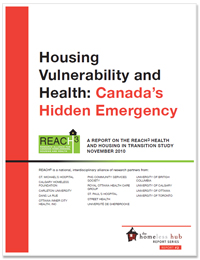By Stephen Hwang & Emily Holton
For the first time in Canada, we have the numbers to show that people who are vulnerably housed face the same severe health problems - and danger of assault - as people who are homeless. This means that the number of people experiencing the devastating health outcomes associated with inadequate housing could be staggering. There are about 17,000 shelter beds available across Canada every night, but almost 400,000 Canadians are vulnerably housed. This means that for each person who is homeless in Canada, there are more than 20 other low-income individuals who are vulnerably housed - paying more than half of their monthly income for rent, and living with substantial risk of becoming homeless. We’ve shed light on a hidden emergency.
For the Health and Housing in Transition (HHiT) study, we interviewed 1200 vulnerably housed and homeless single adults in Vancouver, Toronto, and Ottawa. The results were disturbing. People who don’t have a healthy place to live - regardless of whether they’re vulnerably housed or homeless - are at high risk of serious physical and mental health problems and major problems accessing the health care they need. Many end up hospitalized or in the emergency department. Almost half (40%) of people who don’t have a healthy place to live have been assaulted at least once in the past year, and 1 in 3 (33%) have trouble getting enough to eat.
Check out the report on our early findings here: Housing Vulnerability and Health: Canada’s Hidden Emergency. We’re presenting it today at National Housing Day in Ottawa. Over the next two years, the HHiT study will continue to track the health and housing status of our participants. The results will help us better understand how changes in housing status can affect health. They will also help us to identify factors that help people achieve stable, healthy housing.
Having a roof over one’s head is not enough. The HHiT results showed us that the real gulf in health outcomes doesn’t lie between people who are homeless and people who aren’t homeless. It’s between those who have continued access to healthy housing, and those who don’t. To support health, housing must be decent (i.e. good quality), stable (i.e. affordable), and appropriate to its residents’ needs. We’re calling for the federal government to respond by setting national housing standards that ensure universal, timely access to healthyhousing. The need is overwhelming.
Stephen Hwang's primary appointment is in the Department of Medicine at the University of Toronto, with cross-appointments in the Departments of Public Health Sciences and Health Policy, Management and Evaluation. His research focuses on deepening our understanding of the relationship between homelessness, housing, and health through epidemiologic studies, health services research, and longitudinal cohort studies. His current research projects include a study of predictors of health care utilization in a representative sample of 1,200 homeless men, women, and families in Toronto, a study of the barriers to the management of chronic pain among homeless people, and an evaluation of the effects of a supportive housing program on health and health care utilization among homeless and hard-to-house individuals.
Emily Holton is a research writer and knowledge transfer specialist at the Centre for Research on Inner City Health, St. Michael's Hospital.


